
Mycosphere
metrics 2024
Pioneering insights in ecology and plant research.
Introduction
Mycosphere is a premier open-access journal published by MYCOSPHERE PRESS, dedicated to advancing the field of mycology and contributing significant insights into ecological and plant sciences. Established in 2010 and headquartered in Guiyang, China, this journal has carved out a vital niche, achieving remarkable rankings in the Scopus database—#3 in Ecology, Evolution, Behavior and Systematics and #4 in Plant Science, both boasting a 99th percentile ranking. With an unwavering commitment to disseminating high-quality research, Mycosphere serves as a critical platform for researchers, professionals, and students alike, encouraging robust dialogue and collaborations across the global scientific community. The journal's accessibility, coupled with its impact factor and Q1 categorizations in 2023 for both ecology and plant sciences, substantiate its role as an essential resource for cutting-edge studies and innovations in the field.
Metrics 2024
 5.20
5.20 10.00
10.00 9.00
9.00 40
40Metrics History
Rank 2024
Scopus
IF (Web Of Science)
JCI (Web Of Science)
Quartile History
Similar Journals
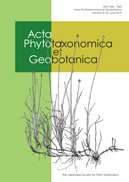
Acta Phytotaxonomica et Geobotanica
Pioneering Discoveries in Phytotaxonomy and GeobotanyActa Phytotaxonomica et Geobotanica, published by the Japanese Society for Plant Systematics at the University of Tokyo, serves as a vital platform for advancing research in the fields of ecology, plant science, and biodiversity. With an ISSN of 1346-7565 and an E-ISSN of 2189-7042, this journal not only provides a comprehensive evaluation of current topics within these categories but also addresses the intricate connections between plant systems and their ecological environments. Although currently not open access, the journal is essential for researchers aiming to publish cutting-edge findings, contributing significantly to its classification within the Q3 quartile across multiple disciplines, including Ecology and Plant Science. With an ambitious focus on enhancing the understanding of plant taxonomy and geography through a convergence of research periods from 2014 to 2024, Acta Phytotaxonomica et Geobotanica plays a pivotal role in fostering academic discourse and innovation in plant systematics. Its geographical foundation in Japan enriches the journal's unique perspective on regional flora, making it an indispensable resource for students, researchers, and professionals in the field.

European Journal of Taxonomy
Bridging science and society in the realm of taxonomy.The European Journal of Taxonomy is a distinguished open access journal, published by the MUSEUM NATL HISTOIRE NATURELLE in France, dedicated to the rich and dynamic field of taxonomy, ecology, and systematics. Since its inception in 2011, this journal has aimed to provide a platform for the dissemination of high-quality research and innovative methods relevant to the study of biodiversity and species classification. With a commendable Q2 ranking in the Ecology, Evolution, Behavior and Systematics category as of 2023, the journal ranks 380 out of 721 in Scopus, highlighting its pivotal role in advancing scientific knowledge in these essential areas. Researchers and students alike will find valuable resources and contributions that address pressing ecological and evolutionary questions from 2015 to 2024. By promoting open access, the European Journal of Taxonomy ensures that vital research is accessible to a broader audience, fostering collaboration and discourse among professionals striving to enhance our understanding of the natural world.
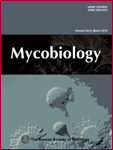
MYCOBIOLOGY
Exploring the Fungal Frontier of ScienceMYCOBIOLOGY is an esteemed open-access journal published by Taylor & Francis Ltd, specializing in the fields of Infectious Diseases, Microbiology, and Plant Science. Since its inception, the journal has provided a platform for innovative research, showcasing a diverse range of studies that delve into the complexities of mycology and its vast implications on health, agriculture, and the environment. With a commendable impact factor and a Q2 ranking in Plant Science as of 2023, MYCOBIOLOGY facilitates the dissemination of vital findings to a global audience of researchers, professionals, and students. In addition to its commitment to high-quality content, MYCOBIOLOGY has embraced open access since 2018, ensuring that the latest advancements in mycological research are readily available to the academic community and the public. By bridging gaps in knowledge and fostering collaboration across disciplines, MYCOBIOLOGY plays a crucial role in advancing our understanding of fungal biology and its myriad applications.

Malaysian Journal of Microbiology
Fostering Collaboration in Microbiology for Global SolutionsMalaysian Journal of Microbiology is a prestigious open-access journal dedicated to advancing the field of microbiology, published by the Malaysian Society for Microbiology. Since its inception in 2005, this journal has become an essential platform for researchers and practitioners, facilitating the dissemination of innovative studies in applied microbiology, biotechnology, and infectious diseases. Based in Penang, Malaysia, this journal not only focuses on local microbiological research but also positions itself within the broader global scientific community. Although currently placed in the Q4 category in several relevant fields—including Applied Microbiology and Biotechnology, Infectious Diseases, and Medical Microbiology according to the 2023 Scopus rankings—it plays a crucial role in encouraging novel research and fostering collaboration among scientists. The journal encourages submissions that contribute to the understanding of microbial processes, disease mechanisms, and novel biotechnological applications, thereby supporting the continuous growth of knowledge in microbiology. With open access since its launch, the Malaysian Journal of Microbiology ensures that all published works are freely available to the public, enhancing their visibility and impact within the scientific community.

Frontiers in Fungal Biology
Transforming Our Understanding of Fungal BiologyFrontiers in Fungal Biology is an innovative academic journal dedicated to advancing the field of mycology and its interdisciplinary connections, published by FRONTIERS MEDIA SA. With an E-ISSN of 2673-6128, this journal focuses on exploring diverse aspects of fungal biology, including ecological roles, evolutionary processes, and interactions with other organisms. Since its inception in 2020, Frontiers in Fungal Biology has garnered attention within the scientific community, earning a commendable Q2 ranking in both Ecology, Evolution, Behavior and Systematics, and Environmental Science categories in 2023, alongside respectable Q3 rankings in Infectious Diseases and Microbiology. The journal is committed to open access principles, making cutting-edge research freely available to a global audience, promoting knowledge sharing and collaboration. By providing a platform for rigorous research and impactful discussions, Frontiers in Fungal Biology aims to enhance the understanding of fungi and their significant roles in ecosystems, health, and biotechnology, appealing to researchers, professionals, and students alike.

SYDOWIA
Fostering Innovation in Botanical and Ecological ResearchSYDOWIA is a prestigious academic journal based in Austria, published by Verlag Ferdinand Berger Sohne Gesellschaft mbH, that has been a cornerstone of scientific publishing since its establishment in 1996. With an ISSN of 0082-0598, SYDOWIA focuses on critical research in the fields of Ecology, Evolution, Behavior and Systematics as well as Plant Science, earning a notable classification in Category Quartiles with Q3 in Ecology-related disciplines and Q2 in Plant Science for 2023. The journal’s strategic insights into agricultural and biological sciences have secured a place within the Scopus rankings, where it holds the position of #191 out of 516 in Plant Science and #278 out of 721 in Ecology categories—reflecting its growing influence with a percentile standing of 63rd and 61st, respectively. Although SYDOWIA is not an Open Access journal, it continues to thrive in delivering scholarly articles that promote advancement and innovation in ecological and botanical research. Researchers, professionals, and students alike can rely on SYDOWIA as a vital resource for disseminating knowledge and fostering exploration in these essential scientific domains.
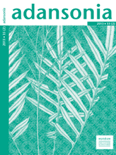
ADANSONIA
Pioneering discoveries in plant science since 2000.ADANSONIA is a distinguished, peer-reviewed open access journal dedicated to advancing the field of plant science. Published by the Publications Scientifiques du Museum in Paris since 2000, this journal serves as a critical platform for sharing innovative research and discoveries in botany, ecology, and related disciplines. With its ISSN 1280-8571 and E-ISSN 1639-4798, ADANSONIA boasts a notable Scopus rank of #383 in the Agricultural and Biological Sciences category and a 2023 category quartile ranking of Q3 in Plant Science, indicating a meaningful contribution to the academic community. The journal's scope encompasses a broad range of topics, making it a vital resource for researchers, professionals, and students alike who are exploring the complexities of plant biology. Based in France, ADANSONIA not only enhances visibility for groundbreaking research but also facilitates open communication amongst scholars, ensuring that knowledge on plant science is accessible worldwide. Located at CP 39-57, Rue Cuvier, F-75231 Paris Cedex 05, France, this journal stands as a testament to the collaborative efforts in the pursuit of scientific excellence in plant sciences.
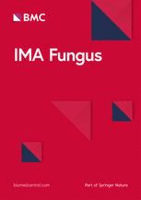
IMA Fungus
Connecting Researchers to the Fungal Frontier.IMA Fungus is an esteemed open-access journal published by BMC, dedicated to advancing research in the fields of fungi, plant sciences, and ecological systems. With an ISSN of 2210-6340 and E-ISSN 2210-6359, this journal has been an influential platform since its inception in 2010, contributing significantly to the scientific community in the United States and beyond. The journal’s remarkable impact can be seen in its Q1 quartile rankings across multiple categories, including Agricultural and Biological Sciences, Ecology, Evolution, Behavior and Systematics, and Plant Science, positioning it among the top literary sources in these fields. Notably, IMA Fungus holds impressive Scopus rankings, with the Agricultural and Biological Sciences category placing it in the 98th percentile, evidencing its crucial role in disseminating impactful research. Given its commitment to fostering accessibility and collaboration, IMA Fungus continues to be an invaluable resource for researchers, professionals, and students aiming to explore and understand the complex roles of fungi within various ecosystems.
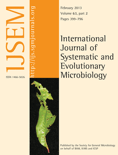
INTERNATIONAL JOURNAL OF SYSTEMATIC AND EVOLUTIONARY MICROBIOLOGY
Unveiling the Microbial World, One Study at a TimeInternational Journal of Systematic and Evolutionary Microbiology, published by the Microbiology Society, stands at the forefront of microbiological research, focusing on the systematic and evolutionary aspects of microorganisms. With its ISSN 1466-5026 and e-ISSN 1466-5034, this prestigious journal not only boasts an impressive impact within its fields—ranked Q1 in both Ecology, Evolution, Behavior and Systematics and Medicine (Miscellaneous), and Q2 in Microbiology for 2023—but also consistently provides an open access platform for researchers to disseminate their findings. Established in 2000, the journal has established itself as an essential resource for professionals and students alike, offering insights into microbial diversity, systematics, and evolutionary pathways. By providing a rich repository of knowledge with a global reach from its UK base, IJSEM continues to enhance our understanding of the microbial world, fostering collaboration and innovation in microbiological science.
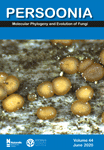
PERSOONIA
Unveiling Insights in Ecology and EvolutionPERSOONIA, a distinguished journal published by RIJKSHERBARIUM, serves as a pivotal platform for the dissemination of high-quality research in the fields of Ecology, Evolution, Behavior, and Systematics, as well as Plant Science. Established with a commitment to advancing scientific knowledge, PERSOONIA has achieved an impressive Q1 ranking in these areas, highlighting its significant impact within the academic community, as evidenced by its ranking of #12 out of 721 journals in its field, placing it in the top 2% of publications. With a publication history that spans from 1996 to present, the journal regularly features innovative studies that push the boundaries of understanding in ecological and botanical sciences. While Open Access options are currently limited, researchers and professionals alike benefit from subscription access to this vital resource. Located in the Netherlands, PERSOONIA continues to be a beacon for scholars aiming to enrich the discourse in evolving ecological and plant science disciplines.